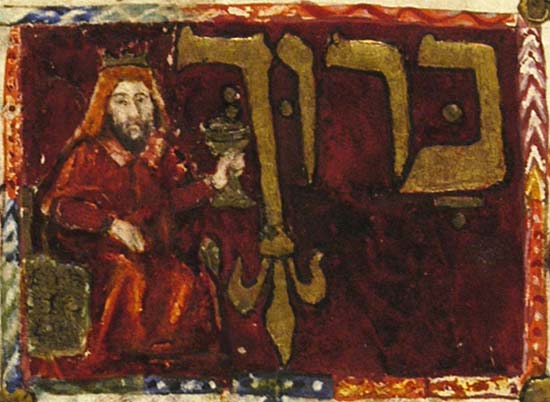
This illuminated initial letter of the so-called Kaufmann Haggadah, copied in Catalonia in the 14th century represents a king raising his goblet to say a blessing: BRWK, that is Baruk Adonai, Blessed be the Lord. The king is in all probability David, for in the haggadah resuming the liturgy of Seder Night this image follows Psalm 113 of David:
Praise the Lord!
Praise the name of the Lord!
Let the name of the Lord be praised both now and for evermore!
From the risig of the sun to the place where it sets, the name of the Lord is to be praised!
The Lord is exalted over all the nations,
his glory above the heavens.
Praise the name of the Lord!
Let the name of the Lord be praised both now and for evermore!
From the risig of the sun to the place where it sets, the name of the Lord is to be praised!
The Lord is exalted over all the nations,
his glory above the heavens.
The Bohemian David Kaufmann (1852-1899) won at a competition the first professor’s chair of the College of Rabbinical Studies of Budapest founded in 1877. He soon learned perfect Hungarian too, as foreseen by the requirements of his new position, and later he left his precious collection of medieval Hebrew manuscripts to the Hungarian Academy of Sciences. We are just working on their web edition with Studiolum.
We have selected this blessing initial from the most famous manuscript of the collection as the emblem of our edition. For David Kaufmann himself became identical with King David for a moment when, out of exuberant joy felt over the purchase of the most ancient – 10th-century Palestinian - manuscript of the Mishnah, he wrote his own thanksgiving poem on the inner endpaper of the manuscript with the title “Psalm of David”.
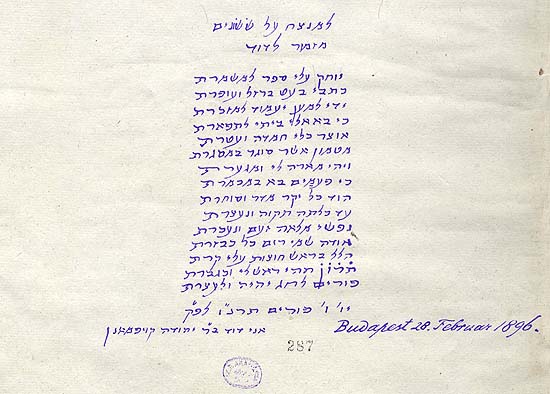
This representation of King David seen exactly in the eschatological light of Seder Night also foresees the figure of the Messiah, as he is described in this beautiful Hassidic song:
| A string of pearls, a golden banner The Messiah, son of David sits on high Holding a goblet in his right hand Making a blessing on the whole land. Amen and amen, this is sure: The Messiah will come this year. If he comes by chariot, There will be good years. If he comes on horseback, There will be good times. If he comes on foot, The Jews will go into the Land of Israel. | Shnirele perele, gildene fon Meshiakh ben Dovid zitst oybn on Er halt a bekher in der rekhter hant, Makht a brokhe afn gantsn land. Omeyn veomeyn, dos iz vor, Meshiakh vet kumen hayntiks yor. Vet er kumen tsu forn, Veln zayn gute yorn. Vet er kumen tsu raytn, Veln zayn gute tsaytn. Vet er kumen tsu geyn, Veln di yidn in erets yisroyl aynshteyn. |
Kata recounts that when the Klezmatics at the very end of the 80’s – among the first signs of the political opening of Hungary – gave a concert in Budapest, and they had been frolicking throughout all the night with such modern klezmers like
Klezmatics: Man in a Hat (3'03") (From the disk Jews with Horns)
at the very end they suddenly stopped short, and then silently started this song: The Messiah will come this year.
Klezmatics: Shnirele perele (6'11") (From the disk Rhythm & Jews)
The public of the concert – secularized Jews of the second and third generation – listened to them in a dumbfounded silence.
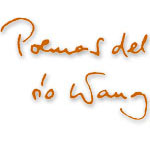




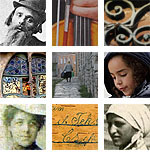
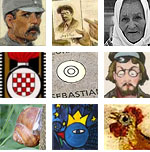
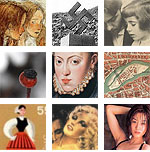
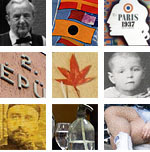
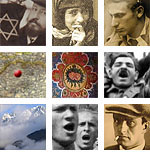
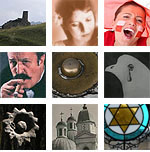
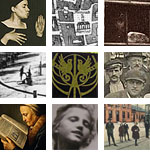
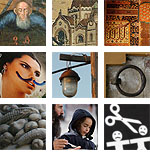
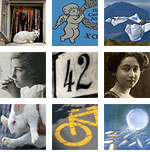
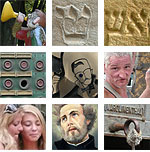
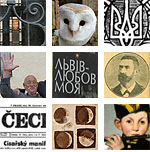
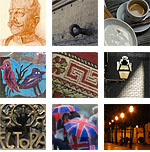
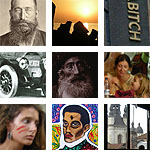
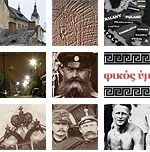
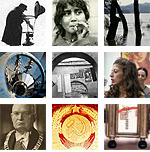
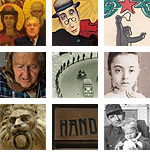
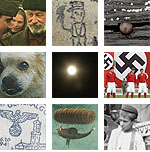

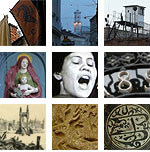
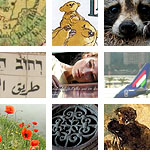
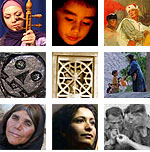
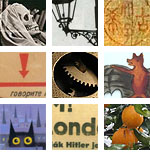
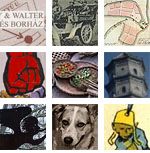
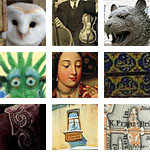
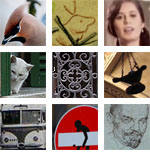
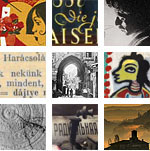
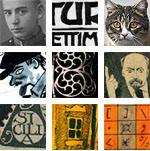
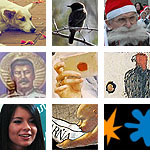
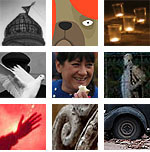
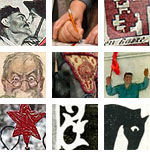
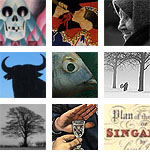
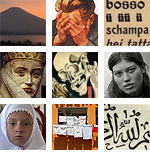
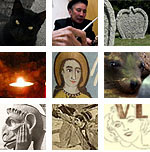
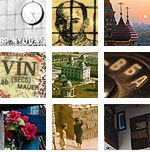
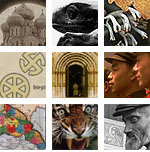
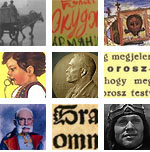
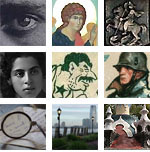

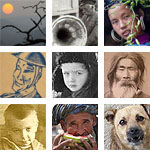
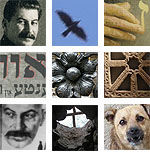
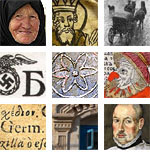
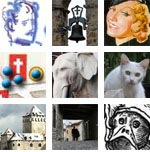
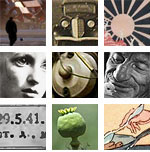
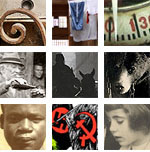
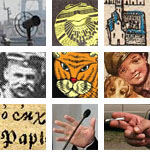
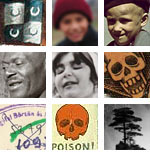
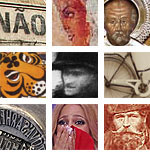
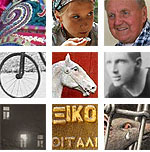
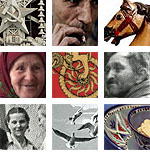
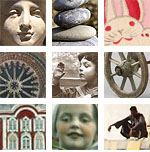


16 comentarios:
Can you please tell me who made the magnificent translation into English of Shnirele Perele?
I am quoting it, but I have no idea whom to credit. You can see my text on:
http://www.sagreiss.org/klezmer_christmas.htm
It was published together with the Yiddish original in the booklet of the Klezmatics CD Rhythm & Jews, without the name of the translator. I have also made some changes in it to better adjust it to the Yiddish original.
You have composed a beautiful page. I am especially happy to see the Yiddish text in Hebrew letters. Perhaps, if you don’t mind, you could also consider to link my page under the David illustration from the Kauffman Haggadah taken from here.
What balls the translator has to quote King James Mathew 2:20 with that beautiful phrase: "go into the land of Israel." In the real Bible they "go into the land of Egypt". In Hebrew you "go up to Israel". Are those your words, or the words you found on the CD jacket?
Please let me know your name, and indicate the changes you made to the CD jacket translation. I'll be happy to post a link.
Yes, you are right, that line is my change. The Klezmatics translation only said there “the Jews will live in erets yisroyl”, but I preferred to give a more exact translation of the Yiddish original. I did not realize the evangelical connotation of this phrase, but you are right in pointing it out.
Anyway, this is how it stands in the Yiddish original, and while on the one hand it logically derives from the structure of German, on the other hand some contamination with Christian liturgical texts quoting this verse of Matthew is not excluded either.
I do not think my changes (the most important was this line and then some three or four words passim, but I do not have the CD at hand to exactly tell where) merit a reference by name, but it would not be bad to link the beautiful manuscript illustration with the blessing David, taken from the 14th-century Catalan Hebrew Kaufmann Codex published by us to this post.
Perhaps you will be also interested in another Messiah-waiting Jewish song, analyzed together with my Hebraist brother in this same blog here and here.
He, he. For some reason I thought that was your improvisation. It was an inspiration, and most certainly merits a nominative link. I wouldn't normally link to someone whose name & location I don't know, although I guess you boys are in Hungary, whose language (with Georgian) is the oddest I have ever heard. I will make an exception, however, if for some reason you wish to remain anonymous.
Contamination is kind of a harsh word, but one cannot write the English language without quoting King James & Shakespeare. That one change is worth mention, so I'll link to both sites, but list the translation as: "Anonymous, reworked by Studiolum", while hoping you will tell me your real name. I wonder why King David is holding the cup in his left hand. That seems like a big boo-boo. Maybe it's some kind of joke, or cabalistic allusion, or maybe the illustrator was left-handed and felt that was superior for writing from right to left, since you keep your hand out of the ink.
I forgot. Did you also rework the Yiddish transliteration, or is that exactly reprinted from the CD?
Improvisation is kind of a harsh word; I prefer your term “inspiration” or, more modestly, a honest literal translation that Klezmatics’s translator failed to provide in this line.
As to the reference of your source of the image of King David, you have misunderstood me. I have not told that I wished to be anonymous. I have only said that in my opinion the changes in the translation did not merit a quotation by name. If I wanted to hide my name (for which I do not see any reason) then I certainly would have not directed you to our publication of the medieval Hebrew codices of the Hungarian Academy of Sciences where one can read the names of the two authors of this blog: Dr. Tamás Sajó, Budapest and Dr. Antonio Bernat Vistarini, Palma de Mallorca (the former being me). But it is also enough to click on the link “Studiolum” on the margin in the section “More from us” to find the same two names. And just in case it might be interesting in the future, the name of my Hebraist brother collaborating with me in the above mentioned post on the Hungarian Hasidic song is György Sajó (København). Nevertheless, in providing reference for your illustration the sites where it was borrowed from are more important than the names: on the one hand this very blog post, and on the other hand the above site, or if you want to be more explicit, the page containing this miniature.
The Yiddish original was copied exactly as it stood in the CD booklet. There was no point in changing it, as it is exactly how they sing it in the recording included (otherwise I would have changed it, too). The idiosyncrasies in the use of minuscula/maiuscula also follow the original.
The goblet held with the right hand is curious indeed. I remember of having read about the importance of the left hand in the medieval Jewish culture of Spain which would tally with this 14th-century Catalonian manuscript. I will try to find that reference.
Tom, I did find your name and use it. The art of "improvisation" is perfectly respectable. I am not much fond of what is known as "literal" translation (nor were the poets of King James), and I don't see how "go into the land of Israel" is any more or less literal a translation of "einstehen". It is however inspired, so we agree.
Since we're talking about poetry & music, might I interest you in setting the whole Bible to music by means of a computer program operating on the data of cantillation marks? You are a professor. I am a poor fool, but I understand cantillation, and you might have access to a computer programmer or two. If you are interested, please check these pages:
http://www.sagreiss.org/ecclesiastes.htm (a mercifully short, concrete example)
http://www.sagreiss.org/Cantillizer.pdf (full documentation)
And an allusion to the wrong Bible is not unheard of in medieval Jewish song, as you can see in "Cuando el Rey Nimrod":
http://www.sagreiss.org/portrait_gallery.htm
Yes indeed, as I have always thought when listening to, quoting and performing on the lute the song del Rey Nimrod myself. This is what I have referred to by saying “contamination”, a feature experienced quite frequently among the Yiddish-speaking Jews of my Eastern Europe.
As to titles, don’t be fooled: I’m a poor fool too who happens to possess a professor’s title (besides being a translator of your beloved Rabelais). Your discussion of cantillation seems very interesting at first glance. But I will read it more carefully, and also show it to my Hebraist brother György who is incidentally also a musicologist.
If you are interested, there is a site to generate Ladino text in the Hebrew alphabet:
http://www.solitreo.com/ladinotype
Rabelais was the perfect man (a doctor and a monk with the right sensibility) at the perfect time to translate the Bible into French. What a shame that he forgot to do it.
Please do talk to George. I've worked with people in the East before. I know that you have no money, but you do have brains & education. That is all we need.
We can solve a thousand-year-old mystery in the Hebrew Bible.
Poor fool means “equal to you”, and it does not have to do anything with money. If you want to seriously offend anyone in the East, then do refer to their payroll, objectively lower than that of their equivalents in the West. But the money at the disposal of someone here is more than his or her payroll. The money of my brothers (we are ten) and of my friends is practically my money, because it is all at my disposal at any moment. Just like mine at theirs. I think this is something people in the West cannot yet fully comprehend, so better let us skip it. As to brains & education, I agree.
In view of the circumstances, I accept your “inspiration” as a great compliment. As to the “literal” translation, with respect of all its limits and all its honesty, I have already put my halfpence in here. As to “einstehen/aynshteyn”, it is a locative verb both in Althochdeutsch and in Yiddish, that means, it has an “into” meaning. Thus translating it like “will go/get into the land of Israel” is much more literal/precise/according to the mental map of the original speakers than to say “will live in erets yisroyl”.
I will speak about the cantillations to George, he will be surely interested in it!
Tom, please accept my apology. I did not mean to offend you. I do not consider money to be a value. In the words of an old friend: "Money is degenerate information, as heat is degenerate energy."
I am literally a poor man. I depend on the generosity of my family & of the French government. I do not think I need to be ashamed of this. I spend my time creating websites of text, images, & music for my daughter & whoever else wishes to see them. I do not think my time would be better spent earning money, which I really don't know how to do.
I have been unable to earn money in East & West, America, France, Canada, Germany, Israel, etc. I have always appreciated that the further East one goes in Europe, the more books & music are appreciated, and the less money is.
I will post a list of potential requirements for the Cantillizer project in a few minutes.
Tom & George,
Here are the requirements of the Cantillizer project. I give the absolute maximum requirements, so that there will be no bad surprises. In reality, I believe it would take less time & effort than this. Please understand that it is extremely unlikely that anyone would ever earn any money directly from this project, which will be distributed free of charge on SourceForge under an LGPL license. On the other hand, all academic credit is up for grabs, as I neither want nor need any.
- 2 graduate students both capable of writing an online database program in a LAMP (Linux, Apache, MySQL, PHP/Python/Perl) environment, although an XML database is perhaps preferable to MySQL;
- the 2 graduate students need to commit for one academic year, a thesis program of some kind, for example;
- 1 of the graduate students must read Hebrew;
- 1 of the graduate students must read music;
- both of the graduate students must be interested in the interpretation of the Bible, the Hebrew language, music, linguistics, or some combination of the above;
- both of the graduate students need to be able to read & write English or French, which are the only languages I am capable of writing more or less correctly (the program being all English, left-to-right);
I don't think I'm forgetting anything.
Just out of curiosity I've checked the half a dozen instances of "go into the land of" Caanan/Egypt in the King James Bible. Martin Luther never uses "einstehen", and has no consistent way of translating this. The Hebrew is "yalak" (Strong's number 3212).
Publicar un comentario